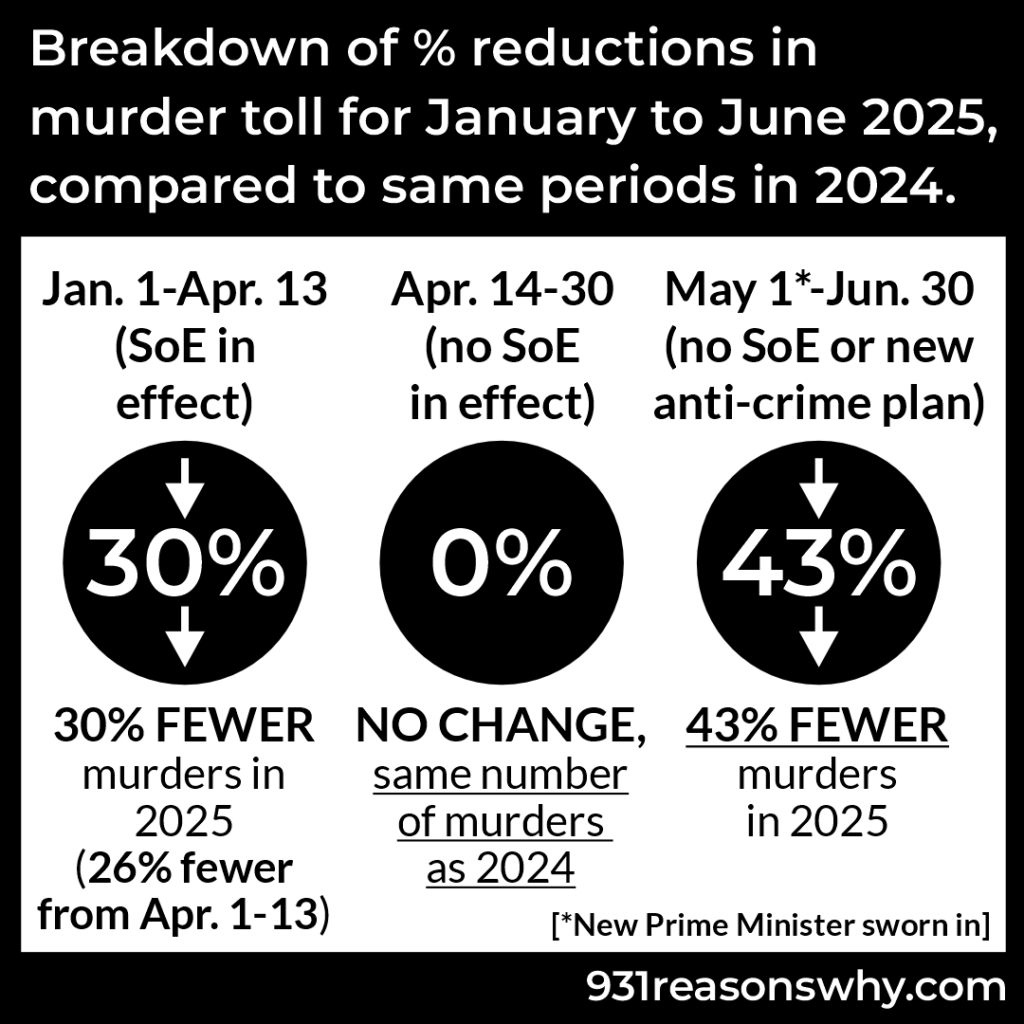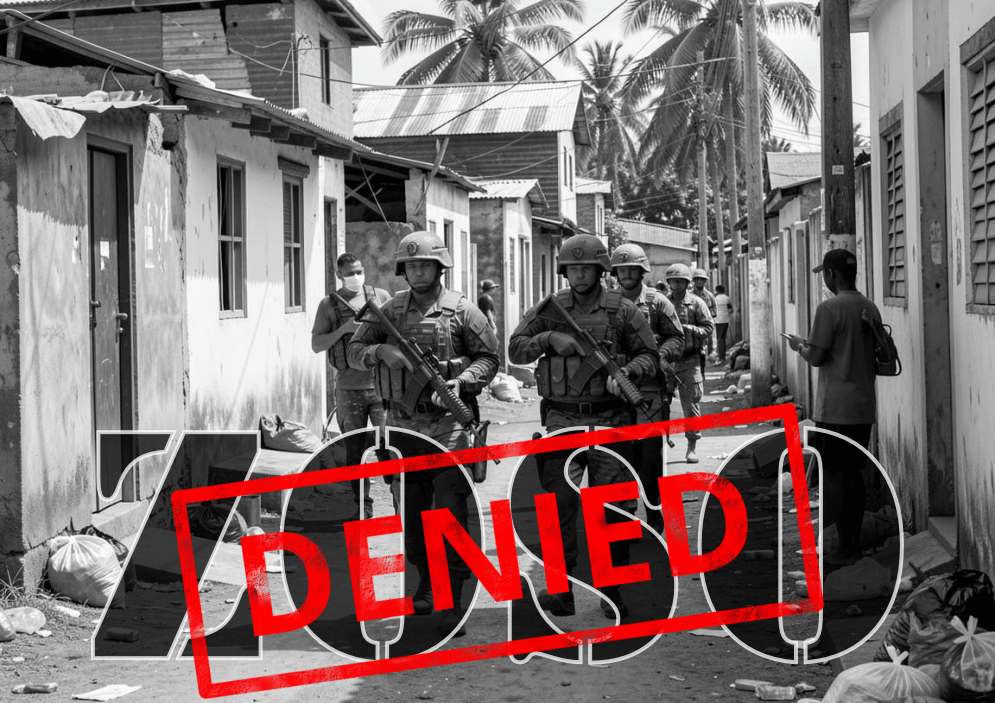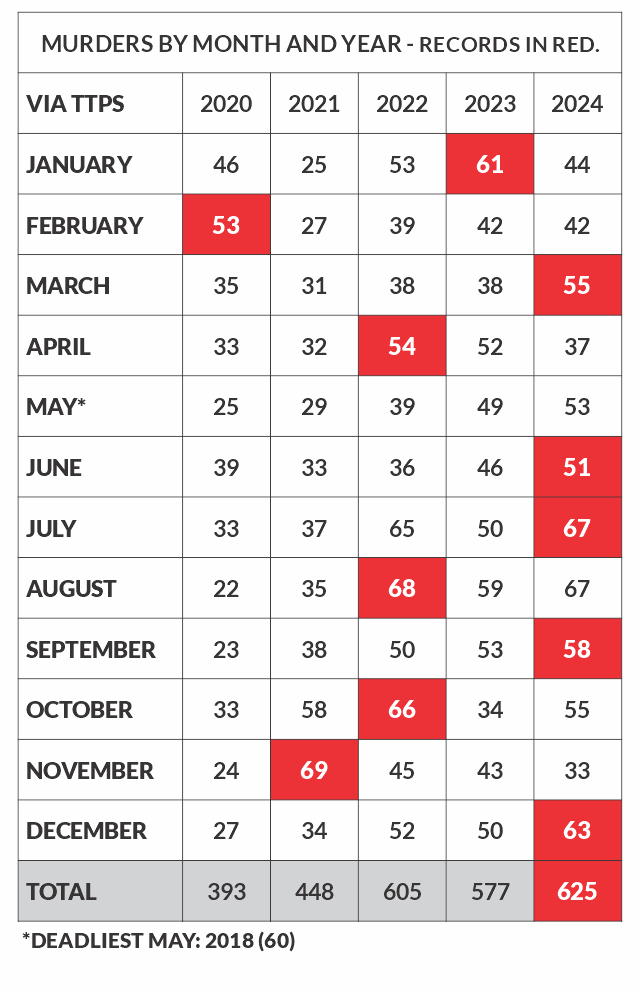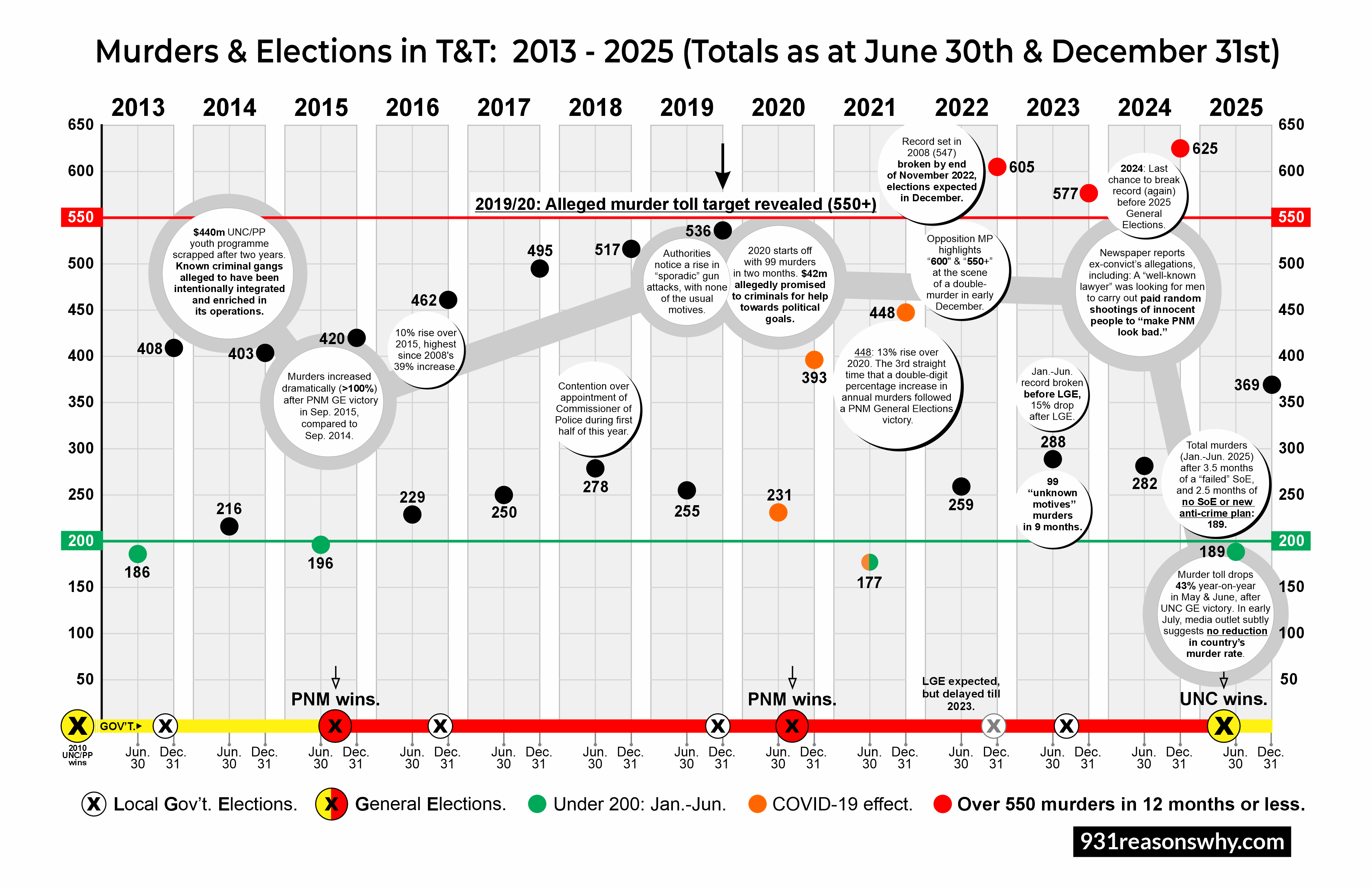“Chaos, when examined closely enough, often reveals design.” The Two Pennies.
Nine hundred and thirty-one. That is our rough estimate of how many men, women, youth and children have been killed in Trinidad & Tobago in random gun attacks between September 2015 and April 2025. Not because of revenge, robbery, or domestic issues, they weren’t in any gangs. They were shot dead while going about their ordinary lives, almost as if it was really all about the sensational headlines, the numbers growing ever higher year after year, and the constant fear of being randomly targeted. There are disturbing allegations and terrible statistics. Looked at separately, they might be easy for some to dismiss. When they are examined together closely, it’s obvious we need an explanation of why so many people were randomly killed. But it’s not just the allegations and the statistics, it’s also about the patterns. Patterns of killing that surged and subsided in step with election seasons, or particular election results. Examine the charts and timeline below, then honestly decide: was there any design at all in our crime chaos? Was regime change through violence against citizens the real mission? Innocent victims deserve justice, those of us who love T&T have to make sure that they get it.
Murder statistics courtesy the Trinidad & Tobago Police Service (TTPS)*, and the Central Statistical Office (CSO). Where there were discrepancies in comparing TTPS & CSO statistics, TTPS figures were assumed to be correct. | Chart of TTPS stats (2013-2025).
*The TTPS website is sometimes taken down, we assume for maintenance, however the chart mentioned above has an accurate record of the murders stats they have published. We have screenshots as well, just in case.
“He (well-known lawyer) started talking to me, asking me if I could talk to some gang leaders and men to do some shootings in the East-West Corridor, random shootings and to make PNM look bad…He also said people…were paying good money for it to be done…I want to let everyone know how dangerous these people are and how far they willing to go.”
*From an ex-convict’s police statement given in 2022 or 2023.*
Published in the SUNDAY EXPRESS, March 31st, 2024.


PNM | UNC
All the largest increases shown in the above chart have occurred with the PNM in Government. Why? Well, a former PNM National Security Minister once responded that crime seems to go up when the UNC is in Opposition. At least with murders, statistically he's correct, it happened every time. But was that just an attempt at blame shifting? Can the numbers tell us anything more than the obvious? In May 2025, the first month after the General Elections, there were 43% fewer murders than occurred in May 2024, for which the Trinidad & Tobago Police Service has taken the credit. But given the nature of our justice system, it seems likely that a significant number of gunmen (and their guns) remained on the loose, or were out on bail, after the December 30th to April 13th State of Emergency. This is also borne out by the fact that a credible enough threat could be mounted just over three months later to warrant a second SoE, and the cancellation of our much-loved Independence Day Parade. A threat allegedly specifically against high office holders who would be more likely to respond in like manner to any gun attack, either themselves or through a security detail. Therefore, previous years' high numbers of random shooting attacks against ordinary unarmed citizens remained a real possibility, but didn't materialize in May or June. And surges in killings in July and October, just before and during the second SoE again suggest that the decline in murders post-elections had nothing to do with any lack of gunmen or guns. The decrease in May contrasts sharply with the over 100% more murders seen in September 2015 compared to September 2014, after 2015's General Elections on September 7th. Neither new government would have had enough time to put any significant new policies in place to affect crime one way or another. Were the significant differences in murders immediately after the elections in 2015 and 2025 just coincidences? That doesn't seem believable, so please consider the facts and allegations that follow, especially what happened in late 2019; allegations in the Interim Report of the Joint Select Committee on National Security - Fifth Session (2019/2020) of the 11th Parliament; and the statistics of 2022-2025.
There were 279 murders in the first eight months of 2015, down from 291 in that period in 2014. The General Elections (GE) were held on September 7th and the PNM won, replacing the UNC in government. There were 141 murders in the last four months of 2015, up from 112 in 2014. This spike happened mostly in September which saw 122% more killings than September 2014, 49 vs. 22. 2015 finished with 420 murders after starting off on track to come in lower than 2014's 403.
N.B. In 2014, a $440m UNC/PP youth programme was scrapped only two years after its inception. Among other very serious allegations, known criminal gangs were reported to have been intentionally integrated and enriched in its operations. The three main stories from the Trinidad Express: The $440m LifeSport conspiracy; Inside the $8m LifeSport heist; and Fraud, gang payments, cover-ups. A notable subplot is the allegation that the assassination of a special prosecutor was financed through this programme: The LifeSport connection.
For 2016, murders increased 10% compared to 2015, from 420 to 462. This was the first double-digit percentage increase since a 39% increase in 2008, when 547 were killed compared to 391 in 2007.
(Of note, 2008 and 2016 were each preceded by a year with a PNM General Elections victory.)
Murders increased 7% compared to 2016, from 462 to 495. With less than half of the 5-year term gone, murders have surpassed a figure not seen since 2010 (473 were killed in that year).
Murders increased just 4% compared to 2017, from 495 to 517*. But an unusual number of murders took place in the first half of the year. The killings seemed to put an exclamation mark on the contention that arose around the appointment of a new Commissioner of Police. Gary Griffith became Commissioner in August.
(*517 coincidentally, is the average annual murder toll for the years 2016 to 2024. For 2011 to 2014 it was 385.)
Total murders increased 3% compared to 2018, from 517 to 536, but some things stood out. The first half of 2019 saw 8% fewer murders than that time in 2018, a welcome change. Local Gov't Elections were expected at year's end, and were held on December 2nd. But July to November saw a 15% increase in murders. 2019 switched from trending lower than 2018 to trending higher. Why? And why in those months?
On December 31st, heavily armed gunmen opened fire on passengers and passersby at a taxi stand in downtown Port-of-Spain. Out of the nine injured, one woman later died. Analysis of the incident revealed that there were no rival gang members or specific persons of interest to the shooters in the vicinity. But it was revealed that a gang leader allegedly issued an instruction to "ensure that the homicide rate for 2019 crossed the previous record (set in) 2008." [Report Pgs. 10-11, points n) to x)]* - General Elections were due within less than a year.
The second-half total of 281 became the largest half-year total according to monthly stats available from the Trinidad & Tobago Police Service (TTPS). However, 2008's record of 547 killings remained intact for a while longer.
* "p) The shootings were sporadic [i.e. random], in particular at persons who were in no way connected with crime. There was no motive of robbery, gang or domestic violence and as a result the Ministry and other agencies started monitoring this;" (Emphasis added.)
In the first two months of 2020, 99 murders were recorded. This was the largest total to start any year since before 2013.
In early 2020, there were Parliamentary Joint Select Committee meetings on National Security after certain allegations were made in the public domain. In the Interim Report of this JSC on Pg. 16, point p), the Trinidad & Tobago Police Service claimed to have “received intelligence that a gang leader had stated that their mission was to increase the homicide rate to 550..."
Reportedly at one meeting, then Commissioner of Police Gary Griffith “told the committee there was intelligence that the Opposition promised some $42 million* to criminals, to be paid via two state contracts, if they helped get the Opposition back into power.” Jensen La Vende, NEWSDAY, February 29th, 2020. *Interim Report, Page 17, point f).
It was also reported that there were allegations of connections between 3 Opposition “frontliners” and criminal gang leaders. Ria Taitt, DAILY EXPRESS, February 28th, 2020.
COVID-19 struck thereafter. The incumbent PNM won the elections and the year finished with 393 murders, down by over 140.
The first half of 2021 saw 177 murders, the second half 271, a 53% increase. This was possibly the biggest escalation of violence we've ever seen within a single year percentage-wise. Gary Griffith's 3-year contract as Commissioner of Police was not renewed in August, but he was given an acting appointment by the then Police Service Commission. The Commission subsequently collapsed after several resignations, and its acting appointment of Griffith was ruled by the court to be unconstitutional and illegal. For several weeks the country was without a substantive CoP. Another exclamation mark (similar to what seemed to have occurred in 2018) appears to have been put on this state of affairs by the second deadliest October (58 murders), and deadliest month ever: November (69). An Acting CoP was appointed in mid-December, a month in which only 34 murders were recorded. 448 murders were committed in total, 13% more than 2020. This was the third time in a row that the year immediately after a PNM General Elections victory was marked by a double-digit percentage increase in the murder toll.
In the first half of 2022, there were 259 murders - bad, but not record-breaking. Local Government Elections were expected at year's end. The second half of 2022 brought 346 murders, a horrific unbeaten record. With the elections expected in December, the alleged "mission" of 550 homicides was accomplished before December 1st. In other words, after 259 murders were carried out in six months, 291+ were committed in just five.
At the scene of a tragic double-homicide in early December, an Opposition MP took the opportunity to accuse the Prime Minister of hiding, mention "600," and emphasize that the entire country was in mourning...from the 550+ murders.
The LGE eventually took place in 2023 after legal wrangling all the way to the Privy Council, while 2022 finished with a new record of 605 murders, a sickening 35% increase over 2021.
2023 brought a record-breaking 338 murders up to July 31st (vs. 324 in 2022). The LGE was held in August. Murders were 15% lower in the four months after the elections (180), compared to 2022 (213). Higher before, lower after. As at September 30th, in just those 9 months, the TTPS categorized 99 murders under "unknown motives," the second-largest category behind "gang-related.” (Between September 2015 and April 2025, how many killings categorized as "gang-related" were legitimately so, and in what way, and how many were actually part of an alleged incentivized numbers game for someone's political agenda?)
"This thing that is going on where they are just going around killing innocent people’s children, I don’t know for what reason, they have to just stop it. I am fed up with crime.” The words of Kerry-Ann Jacob*, grieving mother of 18-year-old entrepreneur Kaylon Jacob, who was gunned down while delivering a meal to a customer from his grilled food business. "THEY'RE KILLING INNOCENTS" by Ryan Hamilton-Davis, NEWSDAY, July 23rd, 2023.
With the reduction in killings after the LGE, 2023 finished with “only” 577 murders, below the new record just set in 2022, but still well above the alleged mission total of 550. Both 2022 and 2024 had over 200 murders from September to December. 2023 finished below 600 only because of the dip after the elections.
*Compare this mother's plea with the authorities' observations of late 2019/early 2020, from the previously mentioned JSC Report, Pg. 10, points o) and p).
In January 2020, a Letter to the Editor was published on Wired868 with this headline: "TTPS urged to investigate makers of claim that UNC funding crime to destabilise country." The letter writer, allegedly a former UNC Minister, felt that the claim made in a Facebook video was seditious, could result in violence in an election year, and that appropriate legal action should be taken if required.
One of the persons making this claim also shared a screenshot of what seemed to be a post by the leader of a small political party alleging that: "Politicians paid gang members to shoot up town days before Christmas (2019) to drive the murder rate up to make the other side look bad." The post has apparently since been deleted, and this political leader is now a part of the coalition government elected in 2025.
In March 2024, the Trinidad Express published an article with these allegations:
"According to the ex-convict’s police statement*, while he was in jail waiting for the hearing of his appeal case, ‘He (well-known lawyer) started talking to me, asking me if I could talk to some gang leaders and men to do some shootings in the East-West Corridor, random shootings** and to make PNM look bad... he said it will look like gangsters doing the shootings and innocent people getting shot, so therefore it will look bad for the PNM. He also said people...were paying good money for it to be done...I want to let everyone know how dangerous these people are and how far they willing to go.’ " *Recorded by officers in 2022 or 2023. Emphasis added.
From “Lawyer: No action on lawyer’s plot to kill me” by Mark Bassant/SUNDAY EXPRESS - March 31st, 2024. [5th-and-4th-to-last paragraphs]
The ex-convict's allegations, if true, raise some obvious questions: What other kinds of crimes, besides random shootings, had these "people" been paying good money for? Home invasions? Disappearances? Did they stop paying when the PNM was voted out? Or have they continued paying for the occasional random shooting, hoping to de-emphasize the suspiciously dramatic drop in murders after April 28th, 2025? While speaking in the Parliament, Attorney General John Jeremie confirmed one aspect of these disturbing allegations: Sometimes attorneys are involved with the criminal networks operating within our prisons, for unlawful purposes.
Other questions arise from the article if the allegations are true. Who was the targeted lawyer? Was this plot carried out on December 31st 2024, i.e. was his name Randall Hector? How many murders has this well-known lawyer successfully arranged on his own behalf and for others?
2024 broke 2022's calendar year record, helped by the bloodiest December seen over the previous twelve years (63 killed), and four other month-specific records for bloodshed in March (55), June (51), July (67), and September (58). A State of Emergency (SoE) was declared on December 30th.
**Again, compare this allegation with the authorities' observations of late 2019/early 2020, from the same JSC Report, Pg. 10, points o) and p).

The SoE ended on April 13th, at which point there were 112 murders for the year, 48 fewer than 2024’s 160 at that date, a 30% drop. 112 murders in 103 days, still more than one per day during a State of Emergency. From April 14th to 30th there were the same number of murders in 2025 as occurred in 2024, 18 killed. The comparative reduction did not continue to accumulate in those 17 days after the SoE ended. All of the reduction in murders in April 2025 took place during those last 13 days of the SoE: 19 in 2024 down to 14 in 2025. Research has shown that crime levels usually bounce back somewhat after an SoE is lifted (third-to-last paragraph in linked article). And this is exactly what happened with murders in those remaining 17 days of April. But even worse, the impending General Elections was the next event which might negatively impact the murder toll, as apparently happened in 2015. However, after a new Prime Minister was sworn in on May 1st, the murder toll did not continue along April's post-SoE trajectory at 2024 levels; nor was there a huge spike, like was seen in 2015, not in May, or June, or even July.
The combined total of murders for May and June was the lowest two-month total of any two consecutive months since the crime-reducing effects of the COVID-19 pandemic back in 2020-2021. Almost miraculously, there were only 59 murders altogether, compared to 104 in May-June 2024, a 43% drop. 59 dead in 61 days, less than one per day. Does this mean that the election result brought about a greater reduction in murders than the SoE did? Why would this be the case, if that's what happened?
Strikingly, one TV station that some suspect has political leanings (which they are free to have), posed this loaded question in a viewer poll in early July: “Are you concerned that there has been no reduction in the country’s murder rate?” They did not provide any figures to back up the claim subtly suggested within the question. But a media organization of that size and reputation should have known that the reduction in murders was nearing the 100 mark, as was revealed the following Sunday. That's actually a very real reduction. The difference of 48 more than doubled to 99 from May 1st to July 12th, with no SoE or any new anti-crime plan in place. Why would anyone want this fact to be covered up? Free and fair elections were held, there was a certain result and then a notable drop in murders year-on-year unlike 2015 (the last time there was a change of government). Why pretend otherwise? And this isn't paranoia. There were several calls from the public after the elections for updates on crime statistics, especially murders. Outlets which had made a point of actively promoting crime stories and stats in previous months and years, suddenly seemed disinterested in continuing to do so anywhere near as aggressively. Even the TTPS seemed hesitant to provide the figures they obviously would have had.
On July 18th 2025 the nation found itself under another SoE due to an alleged "threat" against high office holders. It was unlike the previous SoE which was "based on continued criminal activity that could endanger public safety", as this US Embassy Security Alert put it. We were told that this new SoE had nothing to do with homicide rates, according to the TTPS [9th paragraph]. Naturally then, citizens have been speculating: Who exactly was under threat? What did they do or not do that angered and united the criminal elements? Did they make any arrangements with these criminals and then not keep their side of the deal? Just as alarming is speculation that the SoE was called to cover up the fact that under this new government, the murder toll was somehow not going to reach the record numbers that it did so easily in recent years, even with no SoE or new anti-crime plan in place, as was hinted at in the miraculous May and June reductions.
Hopefully we'll know the truth about all these matters soon.

Assuming past allegations are true, should we now expect that "people" will continue to pay "good money" for random shootings of innocent citizens, to make the Opposition and Independent benches "look bad" for not supporting the government's Zones of Special Operations Bill? (The government rejected all the suggested amendments that could have improved the Bill, even those the Attorney General agreed with.)

So much bloodshed over the years has had immeasurably negative psychological and economic effects on our nation as a whole, and on traumatized families who will never be the same again. Though we acknowledge the unprecedented disruption caused by COVID-19 at an inopportune time, pressing questions remain. What did the authorities subsequently do about the very serious allegations in the interim JSC report linked above, even as some of these allegations came to match the sordid reality in the lives and deaths of citizens of T&T? More importantly, who was behind what can be described as an almost decade-long, deliberate and cold-blooded massacre? We can't just call hundreds of victims "collateral damage" and move on. Anything done in the darkness must eventually come to light, justice demands it.

If allegations published in the media and by our Parliament are true, as TTPS statistics suggest they are, a political agenda led to hundreds of extrajudicial killings over almost a decade in T&T, in clear violation of human rights. Therefore going forward, Trinidad & Tobago may need its own modified version of South Africa's Truth and Reconciliation Commission:
"The Truth and Reconciliation Commission (TRC) was a court-like restorative justice body assembled in South Africa in 1996 after the end of apartheid. Authorized by Nelson Mandela and chaired by Desmond Tutu, the commission invited witnesses who were identified as victims of gross human rights violations to give statements about their experiences, and selected some for public hearings. Perpetrators of violence could also give testimony and request amnesty from both civil and criminal prosecution." [Wikipedia]
Our experiences are nowhere near theirs, but no less important to address in a sober, systematic, and future-positive way. We have 931 reasons why, plus over a million more.
T&T Flag courtesy: Albert Sydney, CC BY-SA 3.0, via Wikimedia Commons - Resized and cropped.
Please share this page for the sake of the victims, and T&T's future:


